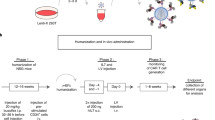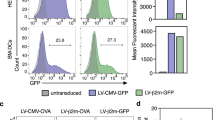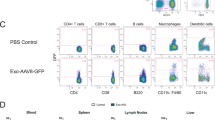Abstract
Dendritic cells (DC) are highly specialised, bone marrow (BM)-derived antigen-presenting cells (APC) that initiate and regulate immune responses. They provide costimulatory signals (in particular, CD40 and the CD28 ligands CD80 and CD86) necessary for naive T cell activation. Functional expression of CD80 and CD86 is blocked by the fusion protein cytotoxic T lymphocyte antigen 4-immunoglobulin (CTLA4Ig), that promotes tolerance induction in animals. Here, replicating mouse (B10; H2b) myeloid DC progenitors, were retrovirally transduced to express CTLA4Ig using the centrifugal enhancement method. Gene product was detected by immunocyto- or histochemistry. Maximal DC transduction efficiency was 62%. Compared with control, zeomycin-resistance gene (Zeo)-transduced DC, CTLA4Ig-expressing cells showed markedly impaired capacity to stimulate naive allogeneic (C3H; H2k) T cell proliferation and cytotoxic T lymphocyte (CTL) generation. Their ability to induce alloantigen-specific T cell hyporesponsiveness was reversed by exogenous IL-2 in secondary mixed leukocyte reactions (MLR). Following local (s.c.) transfer to allogeneic recipients, the genetically modified DC trafficked to T cell areas of draining lymphoid tissue, where transgene expression was detected. Ex vivo analysis of proliferative and CTL responses revealed donor-specific inhibition of alloimmune reactivity by the CTLA4Ig-transduced DC. This effect was associated with marked inhibition of interferon (IFN)-γ production, but significant augmentation of IL-4 and IL-10 secretion. Thus, retroviral transduction of DC permits in vivo delivery of CTLA4Ig to the precise microenvironment where antigen (Ag) presentation occurs. Comparatively nonimmunogenic retroviral vectors, that allow permanent transgene expression in DC, and promote localized delivery of the immunosuppressive transgene product, promote immune deviation and Ag-specific T cell hyporesponsiveness.
This is a preview of subscription content, access via your institution
Access options
Subscribe to this journal
Receive 12 print issues and online access
$259.00 per year
only $21.58 per issue
Buy this article
- Purchase on Springer Link
- Instant access to full article PDF
Prices may be subject to local taxes which are calculated during checkout







Similar content being viewed by others
References
Steinman RM . The dendritic cell system and its role in immunogenicity Annu Rev Immunol 1991 9: 271–296
Banchereau J, Steinman RM . Dendritic cells and the control of immunity Nature 1998 392: 245–252
Lotze MT, Thomson AW (eds) . Dendritic Cells. Biology and Clinical Applications Academic Press: San Diego, CA 1999
Bell D, Young JW, Banchereau J . Dendritic cells Adv Immunol 1999 72: 255–324
Larsen CP et al. Migration and maturation of Langerhans cells in skin transplants and explants J Exp Med 1990 172: 1483–1493
Stumbles PA et al. Resting respiratory tract dendritic cells preferentially stimulate T helper cell type 2 (Th2) responses and require obligatory cytokine signals for induction of Th1 immunity J Exp Med 1998 188: 2019–2031
Austyn JM . The initiation of immune responses and allograft rejection. In: Rose ML, Yacoub MH (eds) Immunology of Heart and Lung Transplantation Little Brown: Boston 1993 pp 22–41
Larsen CP, Morris PJ, Austyn JM . Migration of dendritic leukocytes from cardiac allografts into host spleens: a novel route for initiation of rejection J Exp Med 1990 171: 307–314
Lechler RI, Batchelor JR . Restoration of immunogenicity to passenger cell-depleted kidney allografts by the addition of donor strain dendritic cells J Exp Med 1982 155: 31–41
Taniguchi H, Toyoshima T, Fukao K, Nakauchi H . Presence of hematopoietic stem cells in the adult liver Nature Med 1996 2: 198–203
Watanabe H, Miyaji C, Seki S, Abo T . c-kit+ stem cells and thymocyte precursors in the livers of adult mice J Exp Med 1996 184: 687–693
Drakes ML, Lu L, Subbotin VM, Thomson AW . In vivo administration of flt3 ligand markedly stimulates generation of dendritic cell progenitors from mouse liver J Immunol 1997 159: 4268–4278
Lu L et al. Growth of donor-derived dendritic cells from the bone marrow of liver allograft recipients in response to granulocyte/macrophage colony-stimulating factor J Exp Med 1995 182: 379–387
Thomson AW et al. Microchimerism, dendritic cell progenitors and transplantation tolerance Stem Cells 1995 13: 622–639
Thomson AW, Lu L . Are dendritic cells the key to liver transplant tolerance? Immunol Today 1999 20: 27–32
Lu L, McCaslin D, Starzl TE, Thomson AW . Mouse bone marrow-derived dendritic cell progenitors (NLDC 145+, MHC class II+, B7–1dim, B7–2−) induce alloantigen-specific hyporesponsiveness in murine T lymphocytes Transplantation 1995 60: 1539–1545
Rastellini C et al. GM-CSF stimulated hepatic dendritic cell progenitors prolong pancreatic islet allograft survival Transplantation 1995 60: 1366–1370
Fu F et al. Costimulatory molecule-deficient dendritic cell progenitors (MHC class II+, B7–1dim, B7–2−) prolong cardiac allograft survival in non-immunosuppressed recipients Transplantation 1996 62: 659–665
Hayamizu K, Huie P, Sibley K, Strober S . Monocyte-derived dendritic cell precursors facilitate tolerance to heart allografts after total lymphoid irradiation Transplantation 1998 66: 1285–1291
Lu L et al. Blockade of the CD40–CD40L pathway potentiates the capacity of donor-derived dendritic cell progenitors to induce long-term cardiac allograft survival Transplantation 1997 64: 1808–1815
Gao J-X et al. CD40-deficient dendritic cells producing interleukin-10, but not interleukin-12, induce T-cell hyporesponsiveness in vitro and prevent acute allograft rejection Immunology 1999 98: 159–170
Enk AH, Angeloni VL, Udey MC, Katz SI . Inhibition of Langerhans cell antigen-presenting function by IL-10. A role for IL-10 in induction of tolerance J Immunol 1993 151: 2390–2398
Steinbrink K et al. Induction of tolerance by IL-10-treated dendritic cells J Immunol 1997 159: 4772–4780
Lu L et al. Fas ligand (CD95L) and B7 expression on dendritic cells provide counter-regulatory signals for T cell survival and proliferation J Immunol 1997 158: 5676–5684
Khoury SJ et al. Ex vivo treatment of antigen-presenting cells with CTLA4Ig and peptide prevents experimental allergic encephalomyelitis in the Lewis rat J Immunol 1996 157: 3700–3705
Linsley PS, Ledbetter JA . The role of the CD28 receptor during T cell responses to antigen Annu Rev Immunol 1993 11: 191–212
Bluestone JA . New perspectives of CD28–B7-mediated T cell costimulation Immunity 1995 2: 555–559
Thompson CB . Distinct roles for the costimulatory ligands B7–1 and B7–2 in T helper cell differentiation Cell 1995 81: 979–982
Turka LA et al. T-cell activation by the CD28 ligand B7 is required for cardiac allograft rejection in vivo Proc Natl Acad Sci USA 1992 89: 11102–11105
Lin H et al. Long-term acceptance of major histocompatibility complex mismatched cardiac allografts induced by CTLA4Ig plus donor-specific transfusion J Exp Med 1993 178: 1801–1806
Pearson TC et al. Transplantation tolerance induced by CTLA4Ig Transplantation 1994 57: 1701–1706
Lu L et al. Genetic engineering of dendritic cells to express immunosuppressive molecules J Leukocyte Biol 1999 66: 293–296
Song W et al. Dendritic cells genetically modified with an adenovirus vector encoding the cDNA for a model antigen induce protective and therapeutic antitumor immunity J Exp Med 1997 186: 1247–1256
Tüting T et al. Autologous human monocyte-derived dendritic cells genetically modified to express melanoma antigens elicit primary cytotoxic T cell responses in vitro: enhancement by cotransfection of genes encoding the Th1-biasing cytokines IL-12 and IFN-α J Immunol 1998 160: 1139–1147
Takayama T et al. Retroviral delivery of viral IL-10 into myeloid dendritic cells markedly inhibits their allostimulatory activity and promotes the induction of T cell hyporesponsiveness Transplantation 1998 66: 1567–1574
Lee W-C et al. Phenotype, function, and in vivo migration and survival of allogeneic dendritic cell progenitors genetically engineered to express TGF-β Transplantation 1998 66: 1810–1817
Lu L et al. Adenoviral delivery of CTLA4Ig into myeloid dendritic cells promotes their in vitro tolerogenicity and survival in allogeneic recipients Gene Therapy 1999 6: 554–563
Judge TA et al. The in vivo mechanism of action of CTLA4Ig J Immunol 1996 156: 2294–2299
Sayegh MH et al. CD28-B7 blockade after alloantigenic challenge in vivo inhibits Th1 cytokines but spares Th2 J Exp Med 1995 181: 1869–1874
Newell KA et al. Blockade of the CD28/B7 costimulatory pathway inhibits intestinal allograft rejection mediated by CD4+ but not CD8+ T cells J Immunol 1999 163: 2358–2362
Steptoe RJ, Thomson AW . Dendritic cells and tolerance induction Clin Exp Immunol 1996 105: 397–402
Thomson AW, Lu L . Dendritic cells as regulators of immune reactivity: implications for transplantation Transplantation 1999 68: 1–8
Jenkinson EJ, Jhittay P, Kingston R, Owen JJ . Studies of the role of the thymic environment in the induction of tolerance to MHC antigens Transplantation 1985 39: 331–333
Matzinger P, Guerder S . Does T cell tolerance require a dedicated antigen-presenting cell? Nature 1989 338: 74–76
Chen W, Sayegh MH, Khoury SJ . Mechanisms of acquired thymic tolerance in vivo: intrathymic injection of antigen induces apoptosis of thymocytes and peripheral T cell anergy J Immunol 1998 160: 1504–1508
Knechtle SJ, Zhai Y, Fechner J . Gene therapy in transplantation Transplant Immunol 1996 4: 257–264
Mathisen PM, Tuohy VK . Gene therapy in the treatment of autoimmune disease Immunol Today 1998 19: 103–105
Giannoukakis N, Thomson AW, Robbins PD . Gene therapy in transplantation Gene Therapy 1999 6: 1499–1511
Sayegh MH et al. Donor antigen is necessary for the prevention of chronic rejection in CTLA4Ig-treated murine cardiac allograft recipients Transplantation 1997 64: 1646–1650
Pearson TC et al. CTLA4-Ig plus bone marrow induces long-term allograft survival and donor specific unresponsiveness in the murine model: evidence for hematopoietic chimerism Transplantation 1996 61: 997–1004
Bahnson AB et al. Centrifugal enhancement of retroviral mediated gene transfer J Virol Meth 1995 54: 131–143
Acknowledgements
This study was supported by National Institutes of Health grants AI 41011 and DK 49745 (AWT). We thank Ms Alison Logar for expert assistance with flow cytometry, Drs Andrea Gambotto, Yasuhiko Nishioka, Levent Balkir and Lina Lu for valued advice and discussion, the Schering Plough Research Institute for recombinant cytokines, and Ms Shelly L Conklin for skilled secretarial support.
Author information
Authors and Affiliations
Rights and permissions
About this article
Cite this article
Takayama, T., Morelli, A., Robbins, P. et al. Feasibility of CTLA4Ig gene delivery and expression in vivo using retrovirally transduced myeloid dendritic cells that induce alloantigen-specific T cell anergy in vitro. Gene Ther 7, 1265–1273 (2000). https://doi.org/10.1038/sj.gt.3301244
Received:
Accepted:
Published:
Issue Date:
DOI: https://doi.org/10.1038/sj.gt.3301244



